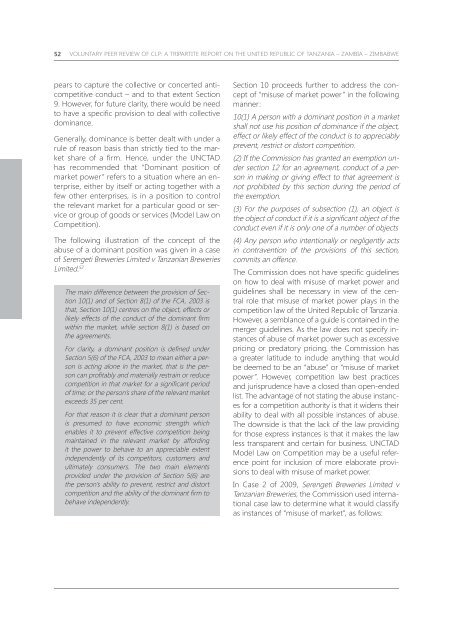a tripartite report - Unctad
a tripartite report - Unctad
a tripartite report - Unctad
Create successful ePaper yourself
Turn your PDF publications into a flip-book with our unique Google optimized e-Paper software.
52 VOLUNTARY PEER REVIEW OF CLP: A TRIPARTITE REPORT ON THE UNITED REPUBLIC OF TANZANIA – ZAMBIA – ZIMBABWE<br />
pears to capture the collective or concerted anticompetitive<br />
conduct – and to that extent Section<br />
9. However, for future clarity, there would be need<br />
<br />
dominance.<br />
Generally, dominance is better dealt with under a<br />
rule of reason basis than strictly tied to the mar-<br />
<br />
has recommended that “Dominant position of<br />
market power” refers to a situation where an enterprise,<br />
either by itself or acting together with a<br />
few other enterprises, is in a position to control<br />
the relevant market for a particular good or service<br />
or group of goods or services (Model Law on<br />
Competition).<br />
The following illustration of the concept of the<br />
abuse of a dominant position was given in a case<br />
of Serengeti Breweries Limited v Tanzanian Breweries<br />
Limited. 52<br />
The main difference between the provision of Section<br />
10(1) and of Section 8(1) of the FCA, 2003 is<br />
that, Section 10(1) centres on the object, effects or<br />
<br />
within the market, while section 8(1) is based on<br />
the agreements.<br />
<br />
Section 5(6) of the FCA, 2003 to mean either a person<br />
is acting alone in the market, that is the per-<br />
<br />
<br />
of time; or the person’s share of the relevant market<br />
exceeds 35 per cent.<br />
For that reason it is clear that a dominant person<br />
is presumed to have economic strength which<br />
enables it to prevent effective competition being<br />
maintained in the relevant market by affording<br />
it the power to behave to an appreciable extent<br />
independently of its competitors, customers and<br />
ultimately consumers. The two main elements<br />
provided under the provision of Section 5(6) are<br />
the person’s ability to prevent, restrict and distort<br />
<br />
behave independently.<br />
Section 10 proceeds further to address the concept<br />
of “misuse of market power” in the following<br />
manner:<br />
10(1) A person with a dominant position in a market<br />
shall not use his position of dominance if the object,<br />
effect or likely effect of the conduct is to appreciably<br />
prevent, restrict or distort competition.<br />
(2) If the Commission has granted an exemption under<br />
section 12 for an agreement, conduct of a person<br />
in making or giving effect to that agreement is<br />
not prohibited by this section during the period of<br />
the exemption.<br />
(3) For the purposes of subsection (1), an object is<br />
<br />
conduct even if it is only one of a number of objects<br />
(4) Any person who intentionally or negligently acts<br />
in contravention of the provisions of this section,<br />
commits an offence.<br />
<br />
on how to deal with misuse of market power and<br />
guidelines shall be necessary in view of the central<br />
role that misuse of market power plays in the<br />
competition law of the United Republic of Tanzania.<br />
However, a semblance of a guide is contained in the<br />
merger guidelines. As the law does not specify instances<br />
of abuse of market power such as excessive<br />
pricing or predatory pricing, the Commission has<br />
a greater latitude to include anything that would<br />
be deemed to be an “abuse” or “misuse of market<br />
power”. However, competition law best practices<br />
and jurisprudence have a closed than open-ended<br />
list. The advantage of not stating the abuse instances<br />
for a competition authority is that it widens their<br />
ability to deal with all possible instances of abuse.<br />
The downside is that the lack of the law providing<br />
for those express instances is that it makes the law<br />
less transparent and certain for business. UNCTAD<br />
Model Law on Competition may be a useful reference<br />
point for inclusion of more elaborate provisions<br />
to deal with misuse of market power.<br />
In Case 2 of 2009, Serengeti Breweries Limited v<br />
Tanzanian Breweries, the Commission used international<br />
case law to determine what it would classify<br />
as instances of “misuse of market”, as follows:

















